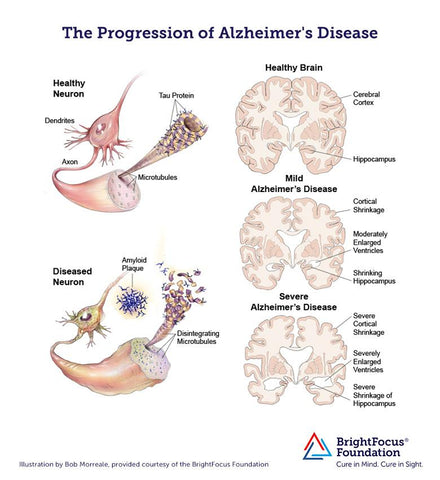on US orders over $100
on all US orders over $100

In the last blog, we discussed Dementia, the causes and signs of it, and the different types of Dementias out there. Today, we are focusing on the most common type, Alzheimer's.

Alzheimer's Disease is a type of Dementia that causes problems with memory, thinking, and behavior. It is a general term for memory loss and other aforementioned cognitive abilities that are serious enough to interfere with daily life. Alzheimer's accounts for 60 to 80 percent of all Dementia cases.
While some memory impairment is part of the normal aging process, Alzheimer's is not. With increasing age, comes the greater risk to develop Alzheimer's. In fact, majority of people with this disease are age 65 and older. However; Alzheimer's Disease is not just a disease that caters to senior citizens.
Studies have shown that approximately 200,000 Americans under the age of 65 have younger-onset, also known as early-onset Alzheimer's. Many people with early-onset Alzheimer's tend to be in their 40s and 50s, and have families, careers, or may even be caregivers themselves. Scientists are still researching the causes of early onset Alzheimer's, though most believe that it is hereditary. As you can see though, Alzheimer's Disease does not discriminate.
Falling under the giant umbrella of Dementia, Alzheimer's Disease is very progressive. It comes in three stages: Mild Alzheimer's Disease (early-stage), Moderate Alzheimer's Disease (middle-stage), and Severe Alzheimer's Disease (late-stage). It can be heartbreaking, not only for the individual, but for his or her loved ones to witness as well. Let's take a closer look at each stage of Alzheimer's Disease.
In the early stages of Alzheimer's Disease, a person may still be able to function independently - meaning, they may still be able to drive, work, and be a part of social events and activities. However; the person may feel as though they are having memory lapses, such as: forgetting familiar words, the locations of familiar places, or the location of every day objects.
During this stage, friends or family members close to the person may begin to notice the person having difficulties and urge them to see a doctor. The doctor will preform a detailed exam to detect if there are any problems in memory or concentration. Symptoms of Mild Alzheimer's include:
Although the onset of Alzheimer's Disease cannot yet be stopped or reversed, an early diagnosis allows the person to have an opportunity to live well with the disease for as long as possible, and to plan for the future.
This stage is typically the longest stage and cast last for many years. As the disease progresses, the person with Alzheimer's may require a greater level of care. During the moderate stage, individuals may have greater difficulty performing ever day, normal tasks, such as: paying bills, cooking, or driving, but they still may remember important details about their life. Symptoms in this stage will be noticeable, and include:
The final stage of this disease can be some of the hardest symptoms for families of their loved one to witness. In this last stage, individuals may need around the clock care and assistance, as they lose the ability to respond to their environment, carry on a conversation, and control movement. As memory and cognitive skills continue to worsen, individuals experience significant personality changes. Symptoms in this stage include:
Late-stage care decisions can be emotionally, financially, and physically demanding for the individual and the caregiver. If you or a loved one are experiencing any of the stages of Alzheimer's, there is help. Your local Alzheimer's Association chapter will connect you with all of the resources that you need to cope with the challenges and symptoms of this disease.

Currently, there is no cure for Alzheimer's Disease, and no treatment, or prevention to reverse, or stop this condition from worsening. According to the Alzheimer's Association, Alzheimer's Disease is the sixth leading cause of death in the United States, and one of the costliest. As of 2018, Alzheimer's and other Dementias cost the nation $277 billion, and by 2050, those costs could rise as high as $1.1 trillion. However; early and accurate diagnosis could save up to $7.9 trillion in medical and care costs.
The number of people living with Alzheimer's is growing at an expediential rate. Every 65 seconds, someone in the United States develops the disease. It is estimated that as of the present day, 5.7 million Americans are living with Alzheimer's, and by 2050, this number is expected to rise to 14 million - an unprecedented increase.
Every 1 in 3 senior citizens dies with Alzheimer's or another form of Dementia. Alzheimer's Disease is a silent killer. While deaths from other diseases, such as heart disease, have decreased by 11%, deaths from Alzheimer's have increased by 123%. Surprisingly, Alzheimer's kills more people than breast cancer and prostate cancer combined.
Scientists, researchers, and doctors are continuing to find ways to cure, if not treat, or reduce the symptoms that Alzheimer's presents. Clinical trials are currently being ran so that new treatments can be created to alter the course of the disease, and improve the quality of life for people living with Alzheimer's and Dementia.

Remember, not all memory loss is linked to Alzheimer's and Dementia. Some memory loss problems can be caused by other medical conditions, or something as simple as a vitamin deficiency. If you or a loved one are experiencing symptoms that mimic Alzheimer's Disease, speak with your doctor so the cause can be determined.
Comments
Leave a comment